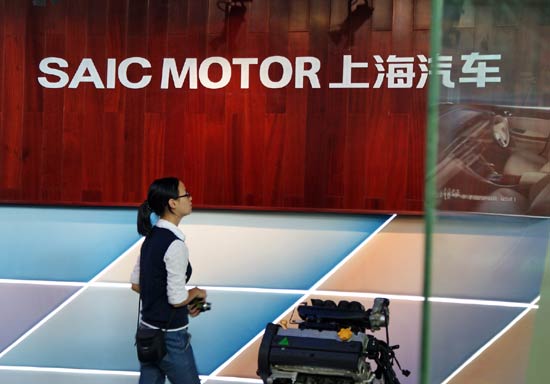Money
Inflation data chills markets
By Irene Shen (China Daily)
Updated: 2011-05-12 10:38
 |
Large Medium Small |
|
 SAIC Motor Corp drops 2.64 percent to 16.61 yuan on Wednesday after China’s car sales slowed in April. [Photo / China Daily] |
April's CPI figures fueled concerns about more tightening measures
SHANGHAI - Stocks on the Chinese mainland fell for the first time in three days on Wednesday.
The retreat came after data showed that inflation exceeded government targets last month, signaling higher interest rates that may slow the world's second-biggest economy.
Jiangxi Copper Co led declines for copper producers on speculation that further monetary tightening will curb demand for industrial metals. SAIC Motor Corp dropped 2.64 percent after China's car sales decelerated in April. Huaxia Bank Co, partly owned by Deutsche Bank AG, and China Merchants Bank Co slid at least 0.9 percent after the nation's consumer prices rose 5.3 percent.
"The higher-than-expected inflation fueled investor concern (about inflation) and more tightening measures," said Li Jun, a strategist at Central China Securities Co in Shanghai.
|
||||
The Shanghai Composite Index slipped 7.2 points to 2883.42 at the 3 pm close. The CSI 300 Index declined 0.3 percent to 3145.08. The Shanghai Composite has declined 5.7 percent from a five-month high on April 18. That's because of concern that the government will add to 10 increases in the reserve-ratio requirements for lenders and four rises in interest rates since early last year to cool inflation. The losses pared the gauge's advance this year to 2.7 percent.
China's April consumer prices exceeded the government's full-year target of 4 percent for a fourth straight month. The gain was more than the 5.2 percent median forecast in a Bloomberg survey of 30 economists and compared with a 5.4 percent increase in March.
Huaxia Bank dropped 1.1 percent to 12.18 yuan ($1.88). China Merchants Bank Co lost 0.9 percent to 14.03 yuan. The nation's new local-currency lending was 739.6 billion yuan last month, according to report from the central bank on Wednesday.
The number posted on the central bank's website compared with the median 700 billion yuan forecast in a Bloomberg survey of 20 economists.
The statistics bureau said on Wednesday that producer prices increased 6.8 percent in April, while retail sales rose 17.1 percent and industrial production gained 13.4 percent. Fixed-asset investment grew 25.4 percent in the first four months of 2011 from a year earlier, Wednesday's report showed.
The government is seeking to control consumer prices that rose to the highest in three years in March without stifling growth.
Inflation is "the most pressing problem" facing China, Vice-premier Wang Qishan said at talks in Washington this week where the US pressed for faster gains in the yuan. Economists predict one more interest-rate increase this year, according to the median forecast from a Bloomberg survey.
China may raise rates "soon'" to control inflation that will range between 5 and 6 percent until July or August, said Stephen Green, head of Greater China research at Standard Chartered Plc.
Jiangxi Copper slumped 1.3 percent to 33.79 yuan. Yunnan Copper Industry Co declined 1.3 percent to 22.92 yuan.
The nation's passenger-car sales slowed in April from the previous month as the government raised fuel prices and Japan's record earthquake slowed deliveries.
Deliveries of autos to dealerships rose 2.8 percent from a year earlier to 1.14 million units, according to a statement from the China Association of Automobile Manufacturers on Tuesday. Sales climbed 6.5 percent in March.
Baoshan Iron & Steel Co, the supplier of half of China's market for automotive steel, lost 0.4 percent to 6.88 yuan.
A gauge of consumer staples in the CSI 300 rose 0.3 percent. Kweichow Moutai surged 0.9 percent to 185.27 yuan. , while its rival Wuliangye Yibin Co added 1 percent to 33.20 yuan.
Wednesday's inflation figures may buttress the case made by US Treasury Secretary Timothy F. Geithner that China needs a stronger yuan to contain prices and spur domestic demand.
Twelve-month non-deliverable forwards climbed 0.06 percent to 6.3438 a dollar as of 10:17 am in Hong Kong, according to data compiled by Bloomberg. The contracts reflect bets that the yuan will strengthen 2.3 percent from the onshore spot rate.
A stronger yuan pares the value of dollar-denominated debt accumulated by buying planes. Every rise of 1 percent in the yuan will add 600 million yuan to Air China's earnings, said Rao Xinyu, head of investor relations. Meanwhile, China Southern said on March 29 that every 1 percent gain in the yuan adds 400 million yuan to earnings.
Bloomberg News
| 分享按鈕 |



